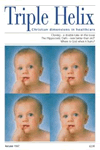There are many books on Christian healing. Most, alas, are superficial and unbalanced but this is more profound than most and addresses the fundamentals. It arose from meetings between Christian health professionals, pastoral workers, theologians and ethicists, coming from different traditions of the healing ministry.
Each chapter is written jointly by a doctor and a theologian and the headings give an idea of the book's scope: How are people healed to-day? - The relationship between the 'medical' and the 'spiritual' in healing. The Church's ministry of healing today. What is health? - Towards a Christian understanding. The significance of Jesus' healing ministry. Suffering. Psychiatry and religion. Growing old and dying.
In 'a Christian understanding' the authors emphasise that health is the gift of God and appropriate medical intervention, whether by drugs, surgery, vaccination or radiotherapy, simply improves the conditions for natural healing to occur. Several contributors deal with the important pastoral question: How should we pray for those who are ill? Services for prayer and healing are considered fully and helpfully.
The psychiatrist acknowledges the common Christian mistrust of psychiatry, and traces this to earlier psychiatrists' misunderstanding of religion, but gives evidence that the situation is improving. He does not believe Christians should insist on seeing a Christian psychiatrist, and thinks any good psychiatrist should respect a patient's central religious belief. Co-operation between health professionals and hospital chaplains is discussed, and in general, chaplains seem more open to it. The final chapter, on growing old and dying, is written jointly by a nurse who lectures in palliative care and a hospice chaplain, and expresses deep concern over the growing secularisation of care for the dying.
Reviewed by
David Short
(Emeritus Professor of Clinical Medicine, Aberdeen University)































